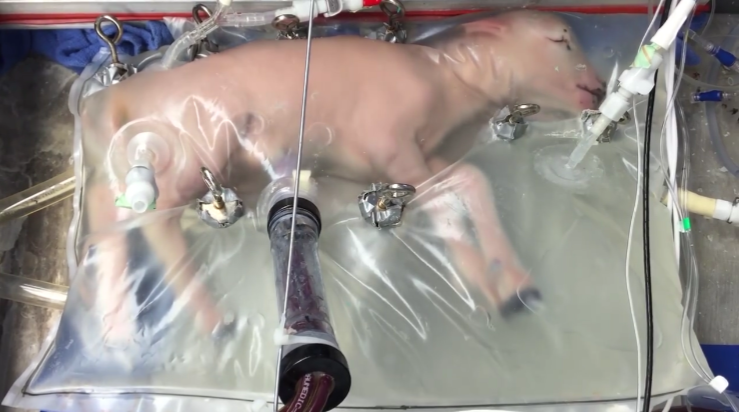It’s going to be a hell of a ride down | Image: NASA / JPL-Caltech
This week we’ve got stories on the beginning of the end for Cassini, an out-of-body experience for lambs born too soon, and Jimmy Wales’s new take on journalism. It’s the news roundup for Sunday, April 30, 2017!
Cassini’s Grand Finale
The Cassini mission to Saturn has an end date: on September 15, it will meet a fiery end in the upper atmosphere of the second-largest planet in the solar system, burning up as it strikes the ever-denser Saturnian atmosphere at orbital speeds. But it’s work isn’t done yet, and this week the team behind the twenty-year-old mission sent the probe somewhere nothing else we’ve ever built has ever gone: between the rings and the planet itself. There are twenty-two more planned low-altitude passes between now and September 15, each one getting closer and closer to the “surface” of the planet (it’s a gas giant, so surface isn’t really the right word). On the final pass it’ll burn up, but in the meantime it’s giving us a hell of a show. This pass should have given scientists an infrared movie of the “rose” — the storm at the center of Saturn’s north pole that Cassini took this fabulous (false colour) shot of back in 2012.

You can check out more on Cassini’s final orbits over at Spaceflight Now, or check out a gallery of fifty of the best photos from the mission over at Gizmodo.

Biobag
The news hit the interwebs this week that scientists have created and successfully tested an “artificial womb,” bringing extremely premature lambs to term, spending as long as four weeks developing as though they were in their mothers. Called the Biobag, it’s a electrolyte fluid-filled plastic sack that interfaces with the developing fetus through its umbilical cord. It’s not meant as a way to eliminate pregnancy entirely—that’s still the stuff of sci-fi, for now—but rather as a way to raise the survival chances of very pre-term births. According to the Verge, roughly 30,000 children are born every year in the US before the 28-week mark. Termed extremely premature, they tend to suffer from a number of developmental ailments that this system could potentially prevent by, in essence, extending the pregnancy outside the womb and giving the child a chance to develop in a way that more closely approximates “normally.” As I say, this has only been tested on lambs, but it’s looking really promising, and could alleviate a lot of suffering in the future. You can read their results in the journal Nature Communications, or read more about it at the Verge.

Wikitribune
Jimmy Wales, the founder of Wikipedia, has a new (unaffiliated) venture: Wikitribune. It’s a crowd-funded newspaper of sorts, that will employ real journalists to be the professional writers and, well, journalists, but will also make use of “citizen journalists”—random folks on the internet working together for free—to sift data, point out factual errors, and so on. So like the not-so-successful WikiNews, but with a layer of actual journalists to keep things professional. It’ll be interesting to see where this goes. Other newspapers have tried the public funding model, for instance ProPublica, but not with this level of citizen engagement in the final product. But if there’s one thing Wales knows, it’s that there are a lot of people out there on the internet willing to invest their time in something if it matters to them. At this point the questions are: can he get enough funding to start, and will people care enough to engage. Only time will tell. You can go donate money to the venture at Wikitribune.com, or read a little more about it at NiemanLab.
Best of the Rest
There really aren’t enough hours in the day, but there are so many cool things to see. Here’s some of them in handy point-form.
- Elon Musk’s Boring Company plans underground sleds to carry your cars under urban spaces at speed
- The SLS won’t fly until 2019 now
- NASA’s working on a greenhouse for Mars (and other places)
- The James Webb Space Telescope is basically ready to go up
- Waymo has been testing a self-driving “Uber” service for months now
- You can now buy a three foot tall Lego Saturn V rocket and OMG OMG I want one, and
- Heineken made an ad that echoes that godawful Pepsi one, but gets a lot more things right
That’s all for today, have a great week.
***
Thanks again for reading. Except for the very *very* occasional tip, we only get paid in my own (and your) enthusiasm, so please like This Week In Tomorrow on Facebook, follow us on Twitter @TWITomorrow, and tell your friends about the site!
If you like our posts and want to support our site, please share it with others, on Facebook, Twitter, Reddit — anywhere you think people might want to read what we’ve written. If there’s something you think we’ve missed or a story you’d like to see covered, drop us a line! Thanks so much for reading, and have a great week.
***
Richard Ford Burley is a human, writer, and doctoral candidate at Boston College, as well as Deputy Managing Editor at Ledger, the first academic journal devoted to Bitcoin and other cryptocurrencies. In his spare time he writes about science, skepticism, feminism, and futurism here at This Week In Tomorrow.

